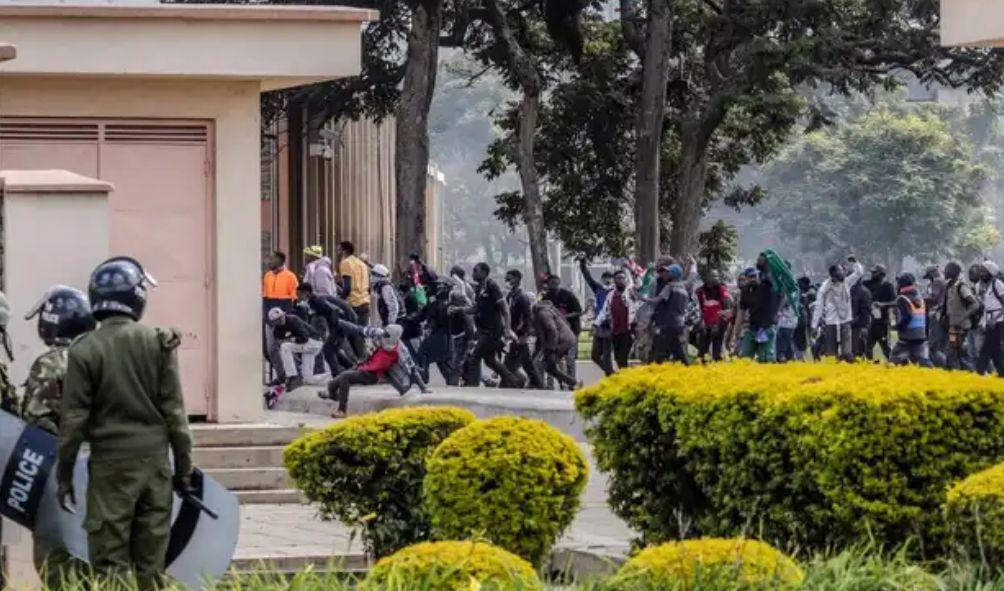Blame Game Over Gen-Z Protests: Deputy President Gachagua Under Fire as Ruto’s Accusations Shift
Kenyans have witnessed a blame game among top government officials over who is responsible for the Gen-Z protests that challenged the Kenya Kwanza administration’s early days.
The June storming of Parliament set off a frantic search for those behind it, as key state officials rejected the idea that it could have been spontaneous.
Blame has been cast in various directions, and it now seems to have landed at the Deputy President’s office.
“I hereby put on notice the planners, financiers, orchestrators, and abettors of violence and anarchy,” declared President Ruto on June 25 after the breach of Parliament by protestors.
The message was clear: someone would be held accountable for the breach of Parliament, the arson at the county government’s headquarters, and the ransacking of the Supreme Court during the protests that ultimately led to the failure of the contentious Finance Act 2024.
“We shall provide a full, effective, and expeditious response to today’s treasonous event,” Ruto added.
But who is actually to blame?
Just two days before the storming of Parliament, Government Spokesman Isaac Mwaura blamed foreign powers for sponsoring the protests, suggesting that Russia or the United States might have been upset by President Ruto’s recent global comments.
“Nikiangalia kwa umbali, could be there’s a foreign hand. Juzi Ruto amesema mambo ya Russian invasion. This issue of de-dollarisation…tujichunge sana,” Mwaura said.
Since then, the blame has been constantly shifting.
Police abductions suggested that the government was desperately trying to find anyone to blame but itself.
Intelligence reports implicated six politicians, a businessman, and two NGOs in allegedly organizing the unrest.
The blame was also directed at former President Uhuru Kenyatta, with some of his close associates reportedly being investigated as potential financiers.
Then came the accusations against the Ford Foundation.
ALSO READ:
- Under and Over 7 — when the rules are simple, but the emotions are intense
- CAF Trophy Hunt: Win iPhone, MacBook, PlayStation, and other prizes in 1xBet promo!
- Rigathi Gachagua Responds to Raila Odinga’s Claim That He Can’t Fix Kenya’s Problems
- Miguna Miguna Criticizes New IEBC Chair Erastus Ethekon, Calls Him a Ruto Ally- ‘Not Independent’
- Matiang’i: No Scores to Settle, I Just Want to Fix My Country
“I want to call out those behind the anarchy in Kenya, those sponsoring chaos in the Republic of Kenya—shame on them because they are funding violence against our democratic nation. I want to ask the Ford Foundation, how will the money they’re using to fund violence benefit them?” Ruto asked.
These accusations were seen as attempts to implicate civil society organizations, with activist Boniface Mwangi’s Sema Ukweli offices also targeted.
However, just days ago, on the sidelines of the United Nations General Assembly, President Ruto seemed to contradict himself by meeting the President of the Ford Foundation, Darren Walker, in New York, and appreciating their support for Kenya’s democracy.
Now, the focus is on allies of Deputy President Rigathi Gachagua, who predicted three months ago that the blame would come his way.
“They want to blame me,” said Gachagua at a previous event, shifting blame to the National Intelligence Service (NIS).
But with the recent decision by the DPP to adopt the DCI’s recommendation to charge two Members of Parliament and three others for the violence during the June 25 protests, it seems the blame has indeed landed at the Deputy President’s doorstep.
Blame Game Over Gen-Z Protests: Deputy President Gachagua Under Fire as Ruto’s Accusations Shift
